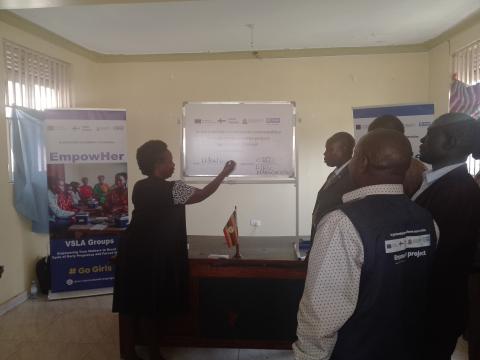Maracha embarks on eradicating adolescent pregnancies

Maracha District has been boosted in the campaign to end unintended adolescent pregnancies with the launching of a project that will be implemented by partners with the support of the district.
The 75,0000 Euros program will also improve access to Sexual Reproductive Health and Rights (SRHR) services and also enhance the capacity of a local civil society organization yet to be identified in addressing issues related to SRHR and Gender-Based Violence (GBV).
The project targeting 16,560 adolescents will be implemented in Koboko and Maracha districts, 2 sub-counties in each district, for Maracha District Tara and Oleba sub-counties have been chosen.
While applauding the European Union and the Finnish Ministry of Foreign Affairs for the funding during the inception meeting on Thursday, June 11, 2025, Maracha Deputy Resident District Commissioner, Ms. Monica Koliba, highlighted that the conducive environment created by government has given donors the confidence to partner and support development initiatives in the country.
“The money is coming from outside but through government, that tells you our government is the best. If the government did not put in place all the favorable conditions this would not happen,” she remarked.
Koliba in committing the district to the successful implementation of the project, said the project should not stray from the guidance issued by President Yoweri Museveni on the controversial subject of comprehensive sexuality education, emphasizing a cautious and guarded approach in information dissemination.
“He (President Museveni) has ever said that thing of sexuality you should teach it in such a way that things that are meant for children should remain for children and things for adults should remain for adults. As we go out to deliver the information, we should know how to treat it,” Koliba stated.
She appealed to implementing partners to strike a balance between software and hardware components of projects since some of the projects that aim at social behavioral change register lasting impact when infrastructure investment is made.
The District Vice Chairperson,Hon. Bosco Asea blamed parents for the several challenges school going children grapple with, whom he accused of having a negative mindset towards the education of their children and abdicating family responsibilities.
“We have a high teenage pregnancy rate, a high number of our children drop out of school, which means the guidance that the parents give to the children is not enough to keep them at school.
“Recently we passed an education ordinance and when we called the head teachers on how best we are going to implement this education ordinance, the feedback we got from the teachers is that we are going to face a lot of challenges because majority of the parents don’t see the value of education,” he said.
The Secretary Social Services, Hon. Dicky Alema whereas pledged support for the program, he called for regular feedback engagements between Plan International Uganda and Patners in Community Transformation (PICOT)—the implementing partners—, and the district in the spirit of promoting accountability and transparency during the execution of the 2.5-year program.
“We have worked with several partners that have come, you realize the inception is done very well but along the way things vanish, they will reappear when the project is ending but along the way you will not know what really took place,” he observed.
The District Youth Councilor-Male, Hon. Vincent Ariaka urged the political wing to ensure the successful implementation of the program noting that will be the basis on which to request for infrastructure development in subsequent programs.
The regional manager Plan International Uganda, Mr. Patrick Emukule said the project is aligned with promoting the Sustainable Development Goals (SDGs) which Uganda is a signatory on this occasion focusing on promoting gender equality which cannot be achieved withcases of teenage pregnancy.
10 primary schools will be selected for project implementation with 5 in each district.
